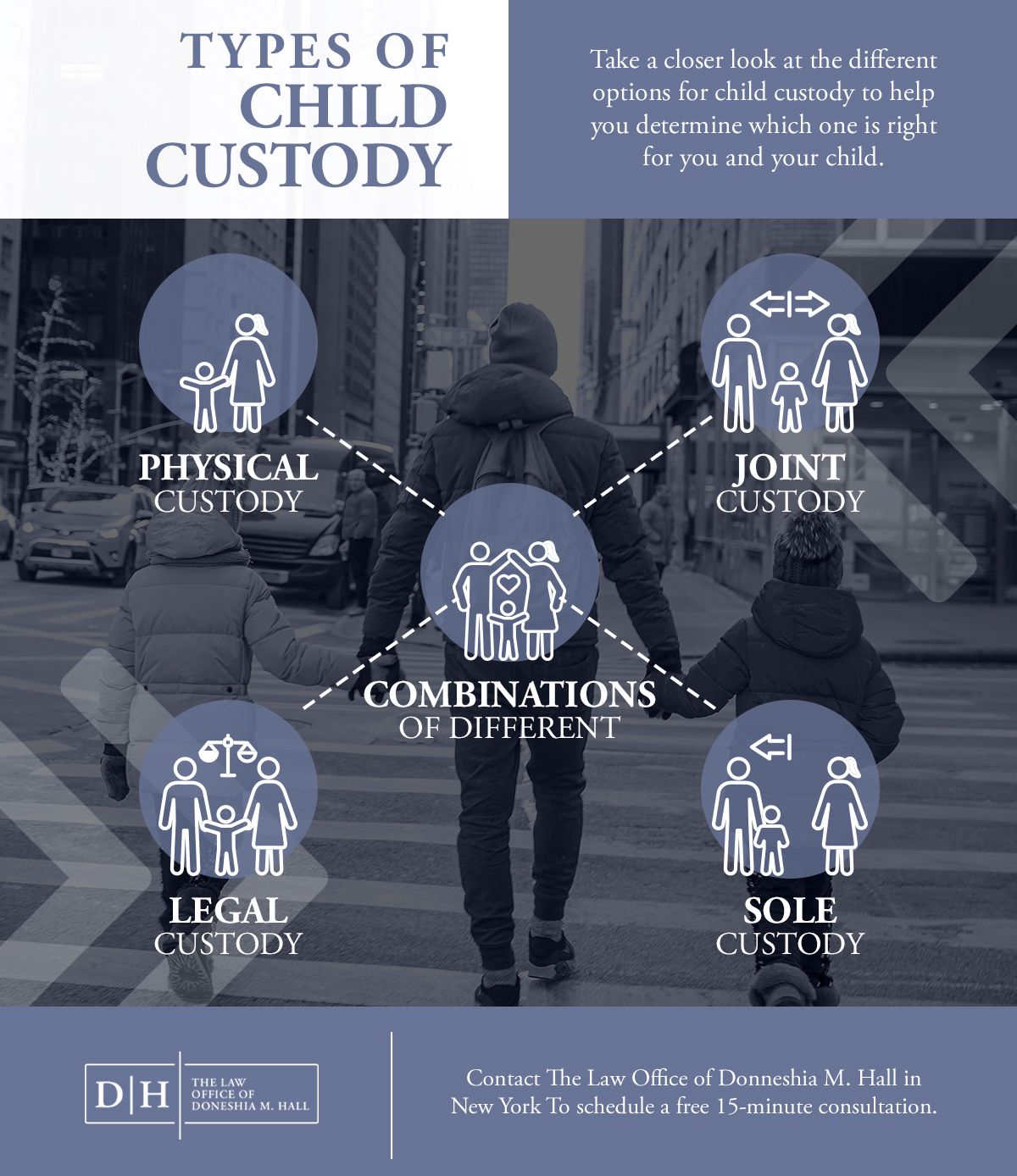
Types of Child Custody
While the ideal environment for any child is to have parents who love one another, this is not always possible. If you are going through divorce and child custody, you might be wondering what the best option is for your child. There are pros and cons to each option, so we’ll take a closer look at what the different options offer to help you determine which one to pursue. At the Law Office of Donneshia M. Hall in NYC, we are here to assist you with everything you need in a child custody battle. Contact us today to schedule a free 15-minute consultation, and get the help you deserve.

Physical Custody
Physical custody is where a parent has the right to have their child live with him or her. When a child lives primarily with one parent and has visitation with the other, the custodial parent (the parent with whom the child primarily lives) will have primary physical custody. The noncustodial parent will have the right to visitation or parenting time.
Legal Custody
If a parent has legal custody of a child, then they have the right and obligation to make decisions about the child’s upbringing. For example, if you have legal custody of your child, you can make decisions about schooling, religious upbringing, and medical care. It is common for courts to award joint legal custody, which means that if you exclude the other parent from the decision-making process, your ex can take you back to court and ask the judge to enforce the custody agreement.
Sole Custody
One parent can have either sole legal custody or sole physical custody of a child. If one parent is deemed unfit, then a court would typically not hesitate to award sole custody to the other parent. Problems with alcohol or drug dependency, as well as charges of child abuse or neglect could cause a parent to be deemed unfit. In many states, courts are moving away from awarding sole custody to one parent. The goal is to ensure that the child can get the benefit of being raised as much as possible by both parents even if the parents are no longer married.
Joint Custody
Joint custody of a child can exist when parents are divorced, separated, no longer cohabiting, or even if they never lived together. This situation involves both parents sharing the decision-making responsibilities, as well as physical custody of the child. Joint custody can include:
- Joint legal custody
- Joint physical custody
- Joint legal and physical custody
If you share joint custody, then you’ll make a schedule that takes into consideration your work schedules, housing arrangements, and the child’s needs. If you are unable to create a schedule with the other parent, then the court will create and impose an arrangement. Joint custody schedules typically include splitting weeks between each parent’s home but can also include alternating months, six-month periods, alternating holidays, and more. Some parents even set up a schedule where they take turns moving in and out of the family home so the child can remain in a familiar environment.
Pros and Cons of Joint Custody
While joint custody allows children to maintain continual contact with both parents and alleviates some of the burdens of parenting for each parent, there are a number of other aspects to consider. You want to do what is best for your child, but when it comes to joint custody you should also make sure to prepare for any of the following possibilities to try to maintain a stable environment for them.
Contrary to what the name implies, joint custody is not necessarily a 50/50 arrangement. With that, if the parents have an acrimonious relationship and are unable to cooperate with one another, the child is left in the middle of a war zone. If you have a high-conflict divorce, consider a sole custody arrangement. Joint custody is better for the child in a low-conflict divorce. It requires a lot of logistical coordination and can be abused to lower child support payments.
Your Divorce Lawyer in New York
Choosing what’s best for your child after your divorce can be incredibly difficult and challenging. At The Law Office of Donneshia M. Hall in NYC, we’re here to give you the legal advice and support you need. Contact our team today to schedule a free 15-minute consultation.
